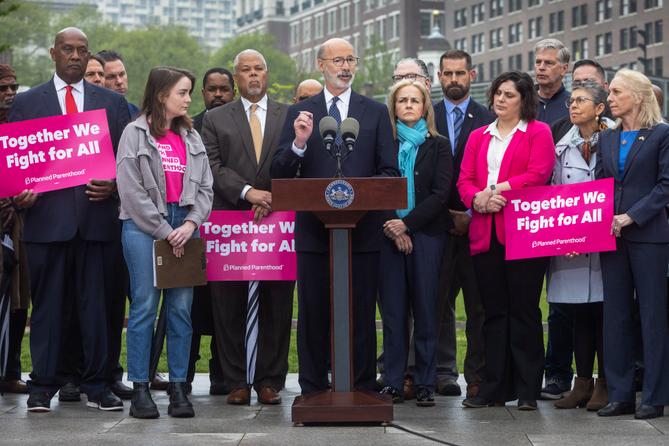Spotlight PA is an independent, nonpartisan newsroom powered by The Philadelphia Inquirer in partnership with PennLive/The Patriot-News, TribLIVE/Pittsburgh Tribune-Review, and WITF Public Media. Sign up for our free newsletters.
HARRISBURG — Democratic Gov. Tom Wolf is suing the Republican-controlled legislature in the state’s highest court over its efforts to change the Pennsylvania Constitution to restrict — and potentially ban — access to abortion, add new requirements for voters at the polls, and scale back executive powers.
Wolf is appealing to the state Supreme Court on an emergency basis, asking its seven justices to block the legislature from advancing a controversial, eleventh-hour measure that would ask voters to weigh in on five proposed amendments to the state’s constitution.
Among them: to declare that the constitution does not provide any rights related to abortion, including taxpayer-funding of the procedure.
Republicans who control both the state House and Senate also want voters to decide whether to require government-issued identification to vote in all instances and to give the legislature more say over rejecting regulations authored by a governor’s administration. They also want to require new election audits in addition to the ones already in place.
Wolf, in his lawsuit, said legislative Republicans rammed through the proposed amendments with little debate as they were wrapping up work on the overdue state budget in early July. In doing so, he contends, GOP lawmakers unconstitutionally lumped together disparate pieces of their “failed” agenda.
The governor also asserted that individual proposed amendments, including the one that would restrict abortion access, violate long-held constitutional protections.
“The Republican-led General Assembly continues to take extraordinary steps to dismantle access to abortion and implement a radical agenda,” Wolf said in a statement Thursday announcing the lawsuit. “Frustrated that their legislation may face my veto pen again, they instead loaded multiple unrelated constitutional amendments into a joint resolution and rammed the bill through during the budget process.”
Legislative Republicans pushed back, contending that Wolf is so power-hungry that he is attempting to deny voters the right to make decisions on important issues.
>> READ MORE: A complete guide and amendment tracker for proposed changes to Pennsylvania’s Constitution
“This lawsuit is not only meritless, but it undermines the ability of the people of Pennsylvania to have a say in how they are governed,” said House GOP spokesperson Jason Gottesman. “Maybe instead of a lame duck governor wasting taxpayer time and resources in court on a ridiculous legal maneuver, he should spend his final days in office working with, rather than against, the General Assembly to improve our elections, make Pennsylvania more competitive, and further insulate the Commonwealth from his Washington, D.C. allies’-induced recession.”
Wolf seeks an emergency decision from the high court because proposed constitutional amendments must be publicly advertised — and his administration would have to begin advertising the five changes on Tuesday, Aug. 2.
The legislature must approve proposed amendments to the state constitution in two consecutive two-year sessions before they appear on the ballot. Then, voters make the final decision.
The latest five proposals would have to be approved again in the legislature’s next session, which begins in January. Voters could be asked to decide as early as the May 2023 election.
Of the proposed constitutional amendments, only one has bipartisan support: changing the way the lieutenant governor is chosen in Pennsylvania. As it stands, the governor and lieutenant governor run separately in the primary election, then as a joint ticket in the general. Lawmakers want to change that so that each major party’s gubernatorial nominee can choose their own running mate early in the process.
A standalone bill to make that change, SB 106, was amended in late 2021 to include additional constitutional revisions, including the voter ID proposal.
The proposal involving abortion access was added in early July as lawmakers scrambled to pass the budget. During a late-night debate that spilled into the next day, Republicans shut down attempts by Democrats to make changes to the final bill, which was approved soon after along largely party lines.
The governor, who is suing together with the state’s top election official, argued that such “multiple, complex” changes — ones that impact personal rights and restructure the balance of power in government — cannot be done through constitutional amendments. Instead, they require a so-called constitutional convention, a rare process used to change state government.
The lawsuit also argues that the legislature’s proposed abortion language violates the state constitution, which recognizes a personal right to privacy, including the right to make personal health care decisions.
The governor also asserts in the lawsuit that the legislature’s proposed voter ID requirement violates the state constitution’s “free and equal” elections clause, and that the proposal to require election audits by the State Auditor General’s Office treads on the judiciary’s powers to decide election disputes.
WHILE YOU’RE HERE… If you learned something from this story, pay it forward and become a member of Spotlight PA so someone else can in the future at spotlightpa.org/donate. Spotlight PA is funded by foundations and readers like you who are committed to accountability journalism that gets results.
